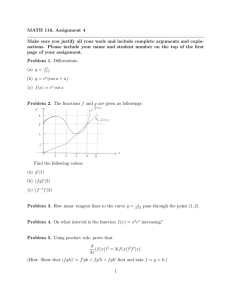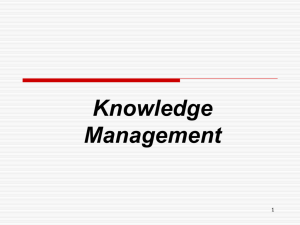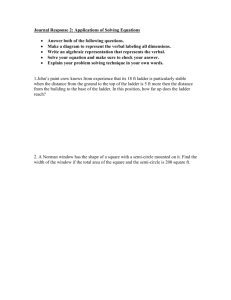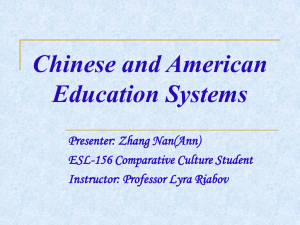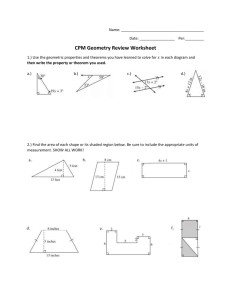Proceedings of Annual Paris Economics, Finance and Business Conference
advertisement
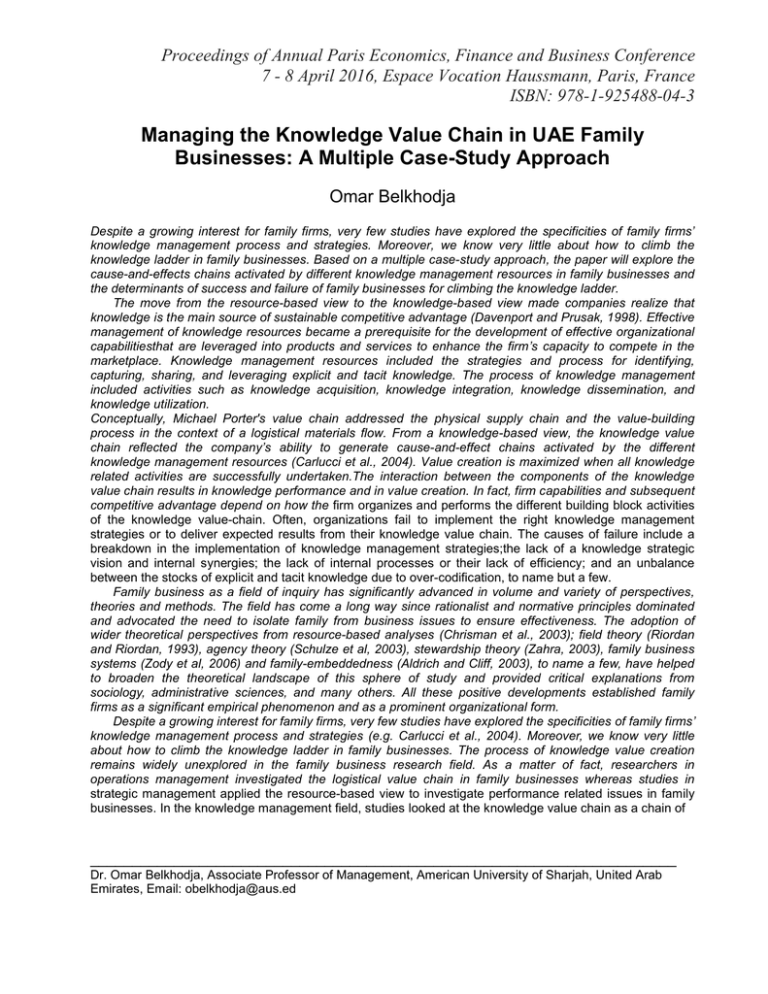
Proceedings of Annual Paris Economics, Finance and Business Conference 7 - 8 April 2016, Espace Vocation Haussmann, Paris, France ISBN: 978-1-925488-04-3 Managing the Knowledge Value Chain in UAE Family Businesses: A Multiple Case-Study Approach Omar Belkhodja Despite a growing interest for family firms, very few studies have explored the specificities of family firms’ knowledge management process and strategies. Moreover, we know very little about how to climb the knowledge ladder in family businesses. Based on a multiple case-study approach, the paper will explore the cause-and-effects chains activated by different knowledge management resources in family businesses and the determinants of success and failure of family businesses for climbing the knowledge ladder. The move from the resource-based view to the knowledge-based view made companies realize that knowledge is the main source of sustainable competitive advantage (Davenport and Prusak, 1998). Effective management of knowledge resources became a prerequisite for the development of effective organizational capabilitiesthat are leveraged into products and services to enhance the firm’s capacity to compete in the marketplace. Knowledge management resources included the strategies and process for identifying, capturing, sharing, and leveraging explicit and tacit knowledge. The process of knowledge management included activities such as knowledge acquisition, knowledge integration, knowledge dissemination, and knowledge utilization. Conceptually, Michael Porter's value chain addressed the physical supply chain and the value-building process in the context of a logistical materials flow. From a knowledge-based view, the knowledge value chain reflected the company’s ability to generate cause-and-effect chains activated by the different knowledge management resources (Carlucci et al., 2004). Value creation is maximized when all knowledge related activities are successfully undertaken.The interaction between the components of the knowledge value chain results in knowledge performance and in value creation. In fact, firm capabilities and subsequent competitive advantage depend on how the firm organizes and performs the different building block activities of the knowledge value-chain. Often, organizations fail to implement the right knowledge management strategies or to deliver expected results from their knowledge value chain. The causes of failure include a breakdown in the implementation of knowledge management strategies;the lack of a knowledge strategic vision and internal synergies; the lack of internal processes or their lack of efficiency; and an unbalance between the stocks of explicit and tacit knowledge due to over-codification, to name but a few. Family business as a field of inquiry has significantly advanced in volume and variety of perspectives, theories and methods. The field has come a long way since rationalist and normative principles dominated and advocated the need to isolate family from business issues to ensure effectiveness. The adoption of wider theoretical perspectives from resource-based analyses (Chrisman et al., 2003); field theory (Riordan and Riordan, 1993), agency theory (Schulze et al, 2003), stewardship theory (Zahra, 2003), family business systems (Zody et al, 2006) and family-embeddedness (Aldrich and Cliff, 2003), to name a few, have helped to broaden the theoretical landscape of this sphere of study and provided critical explanations from sociology, administrative sciences, and many others. All these positive developments established family firms as a significant empirical phenomenon and as a prominent organizational form. Despite a growing interest for family firms, very few studies have explored the specificities of family firms’ knowledge management process and strategies (e.g. Carlucci et al., 2004). Moreover, we know very little about how to climb the knowledge ladder in family businesses. The process of knowledge value creation remains widely unexplored in the family business research field. As a matter of fact, researchers in operations management investigated the logistical value chain in family businesses whereas studies in strategic management applied the resource-based view to investigate performance related issues in family businesses. In the knowledge management field, studies looked at the knowledge value chain as a chain of ______________________________________________________________________ Dr. Omar Belkhodja, Associate Professor of Management, American University of Sharjah, United Arab Emirates, Email: obelkhodja@aus.ed Proceedings of Annual Paris Economics, Finance and Business Conference 7 - 8 April 2016, Espace Vocation Haussmann, Paris, France ISBN: 978-1-925488-04-3 normativecause-and-effect knowledge-based activities that generate capabilities and a competitive advantage. The specificities of the firm’s knowledge management process and strategies have been ignored in the conceptualization of the knowledge value chain. Moreover, a positivist approach of “the more-the better” has been widely adopted in the knowledge management field claiming that companies have to invest heavily in knowledge management tools (mainly in information systems and technology) to create valueregardless of firm’s specificities or knowledge intensity. The objectives of this research are: 1- To provide an integrative knowledge value chain conceptualization that builds on the advances and perspectives adopted in the literatures in strategic management, operations management, family business, and knowledge management. 2- To highlight the specificities of family businesses in terms of knowledge management process and strategies; and knowledge value chain activities. 3- To explore the determinants of success and failure for climbing the knowledge ladder in a family business context. 4- Due to the exploratory nature of the study; to provide propositions as to how to succeed in managing the activities of the knowledge value chain and the chain as a whole. A framework will be designed in future research. 5- To explore how family businesses in knowledge intensive and in less knowledge intensive industries in the United Arab Emirates manage their knowledge value chain activities and the extent to which they are successful in climbing the knowledge ladder. By adopting a multiple-case study approach, intra case analyses and cross case analyses will be conducted. 6- To provide recommendations for practitioners and managers to improve their knowledge management process and strategies, and increase
